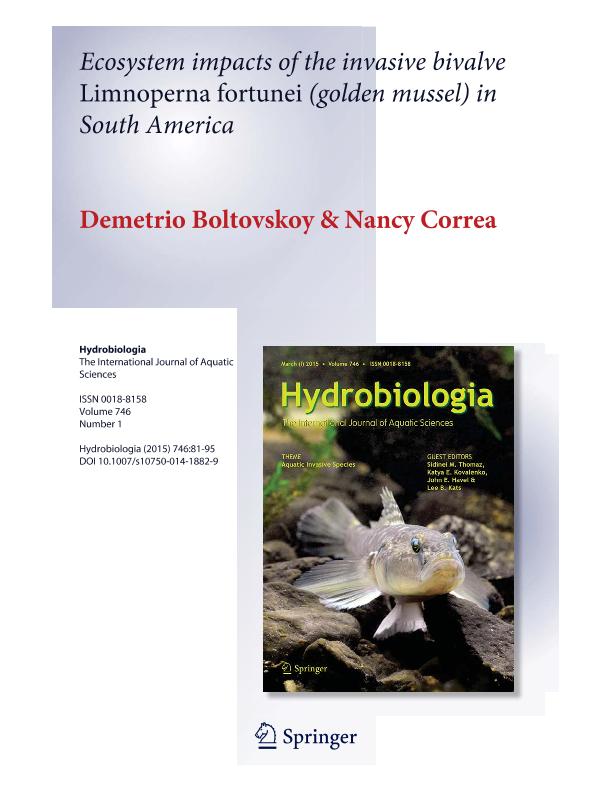Mostrar el registro sencillo del ítem
dc.contributor.author
Boltovskoy, Demetrio

dc.contributor.author
Correa, Nancy Myriam

dc.date.available
2018-02-28T18:22:50Z
dc.date.issued
2015-01
dc.identifier.citation
Boltovskoy, Demetrio; Correa, Nancy Myriam; Ecosystem impacts of the invasive bivalve Limnoperna fortunei (golden mussel) in South America; Springer; Hydrobiologia; 746; 1; 1-2015; 81-95
dc.identifier.issn
0018-8158
dc.identifier.uri
http://hdl.handle.net/11336/37407
dc.description.abstract
We summarize current knowledge on the effects of the invasive Asian bivalve Limnoperna fortunei (introduced in South America around 1990) on local biota. Limnoperna modifies nutrient concentrations and decreases concentrations of particulate organic matter in the water-column (including phytoplankton and zooplankton), thus enhancing light penetration and stimulating growth of periphyton and macrophytes. Selective grazing and modification of the N:P ratio are responsible for strong enhancements of toxic cyanobacterial blooms. Limnoperna beds significantly enhance the numbers, biomass and diversity of practically all accompanying invertebrates. The mussel´s planktonic larvae represent an important food item for the larvae of 18 fish species, while juveniles and adults are consumed by at least 50 fish species. Limnoperna is the first and only abundant benthic filter-feeding animal in South American continental waters. The fact that it intercepts and retains in the freshwater lotic domain particulate organic matter that would otherwise be swept into the sea must represent an important energetic subsidy, but the ecosystem-wide consequences of this trophic shift have not yet been addressed. Comparison with the impacts of the zebra mussel in Europe and North America suggest important differences.
dc.format
application/pdf
dc.language.iso
eng
dc.publisher
Springer

dc.rights
info:eu-repo/semantics/openAccess
dc.rights.uri
https://creativecommons.org/licenses/by-nc-sa/2.5/ar/
dc.subject
Limnoperna
dc.subject
Impacto
dc.subject.classification
Otras Ciencias Biológicas

dc.subject.classification
Ciencias Biológicas

dc.subject.classification
CIENCIAS NATURALES Y EXACTAS

dc.title
Ecosystem impacts of the invasive bivalve Limnoperna fortunei (golden mussel) in South America
dc.type
info:eu-repo/semantics/article
dc.type
info:ar-repo/semantics/artículo
dc.type
info:eu-repo/semantics/publishedVersion
dc.date.updated
2018-02-28T14:13:06Z
dc.journal.volume
746
dc.journal.number
1
dc.journal.pagination
81-95
dc.journal.pais
Alemania

dc.journal.ciudad
Berlin
dc.description.fil
Fil: Boltovskoy, Demetrio. Consejo Nacional de Investigaciones Científicas y Técnicas. Oficina de Coordinación Administrativa Ciudad Universitaria. Instituto de Ecología, Genética y Evolución de Buenos Aires. Universidad de Buenos Aires. Facultad de Ciencias Exactas y Naturales. Instituto de Ecología, Genética y Evolución de Buenos Aires; Argentina
dc.description.fil
Fil: Correa, Nancy Myriam. Ministerio de Defensa. Perfectura Naval Argentina; Argentina
dc.journal.title
Hydrobiologia

dc.relation.alternativeid
info:eu-repo/semantics/altIdentifier/doi/http://dx.doi.org/10.1007%2Fs10750-014-1882-9
dc.relation.alternativeid
info:eu-repo/semantics/altIdentifier/url/https://link.springer.com/article/10.1007%2Fs10750-014-1882-9
Archivos asociados
